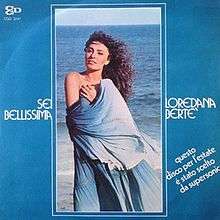Sei bellissima
"Sei bellissima" is an Italian ballad song written by Claudio Daiano and Gian Pietro Felisatti and performed by Loredana Bertè. During the years Bertè claimed to be the actual composer of the song, but that at the time she was unable to sign it as she was not a member of SIAE. According to Bertè, lyrics were inspired by her relationship with Adriano Panatta.[1]
| "Sei bellissima" | ||||
|---|---|---|---|---|
 | ||||
| Single by Loredana Bertè | ||||
| from the album Normale o Super | ||||
| B-side | "Spiagge di notte" | |||
| Released | 1975 | |||
| Genre | Pop | |||
| Length | 4:50 | |||
| Label | CGD | |||
| Songwriter(s) | Claudio Daiano, Gian Pietro Felisatti | |||
| Loredana Bertè singles chronology | ||||
| ||||
The musical arrangement by Vince Tempera was inspired by Riccardo Cocciante's "Bella senz'anima".[2]
The song premiered at the 1975 Un disco per l'estate, being eliminated from the competition;[2] nevertheless, the single was a commercial success, peaking at the thirteenth place on the Italian singles chart.[3] The song was the first hit for Bertè, following the commercial failure of her debut album Striking.[2]
The verse "a letto mi diceva sempre non vali che un po' più di niente" (i.e. "in bed he used to say 'you are not worth a bit more than anything'") was initially censored and replaced by "e poi mi diceva sempre non vali che un po' più di niente" ("and then he used to say 'you are not worth a bit more than anything'"). A version with the original lyrics was eventually released the same year.[2][4]
Track listing
- 7" single – CGD 3247
- A "Sei bellissima" (Claudio Daiano, Gian Pietro Felisatti) – 4:50
- B "Spiagge di notte" (Daniele Pace) – 3:00
Charts
| Chart | Peak position |
|---|---|
| Italy[3] | 13 |
References
- Loredana Bertè. Traslocando: È andata così. Rizzoli, 2014. ISBN 8858682866.
- Ezio Guaitamacchi. 1000 canzoni che ci hanno cambiato la vita. Rizzoli, 2009. ISBN 8858617428.
- Dario Salvatori. Storia dell'Hit Parade. Gramese, 1989. ISBN 8876054391.
- "Loredana Bertè". Hit Parade Italia. Retrieved 15 July 2016.